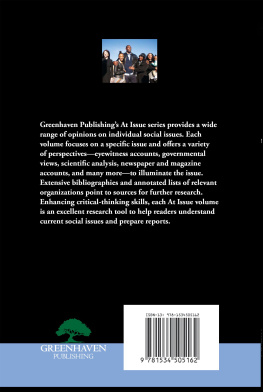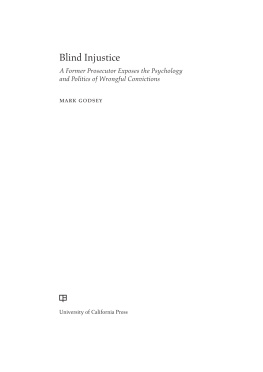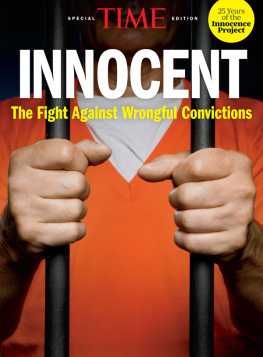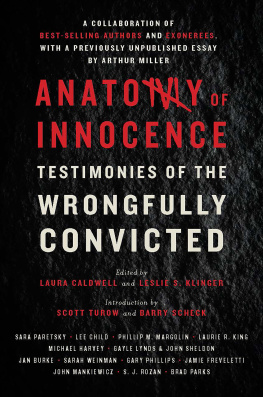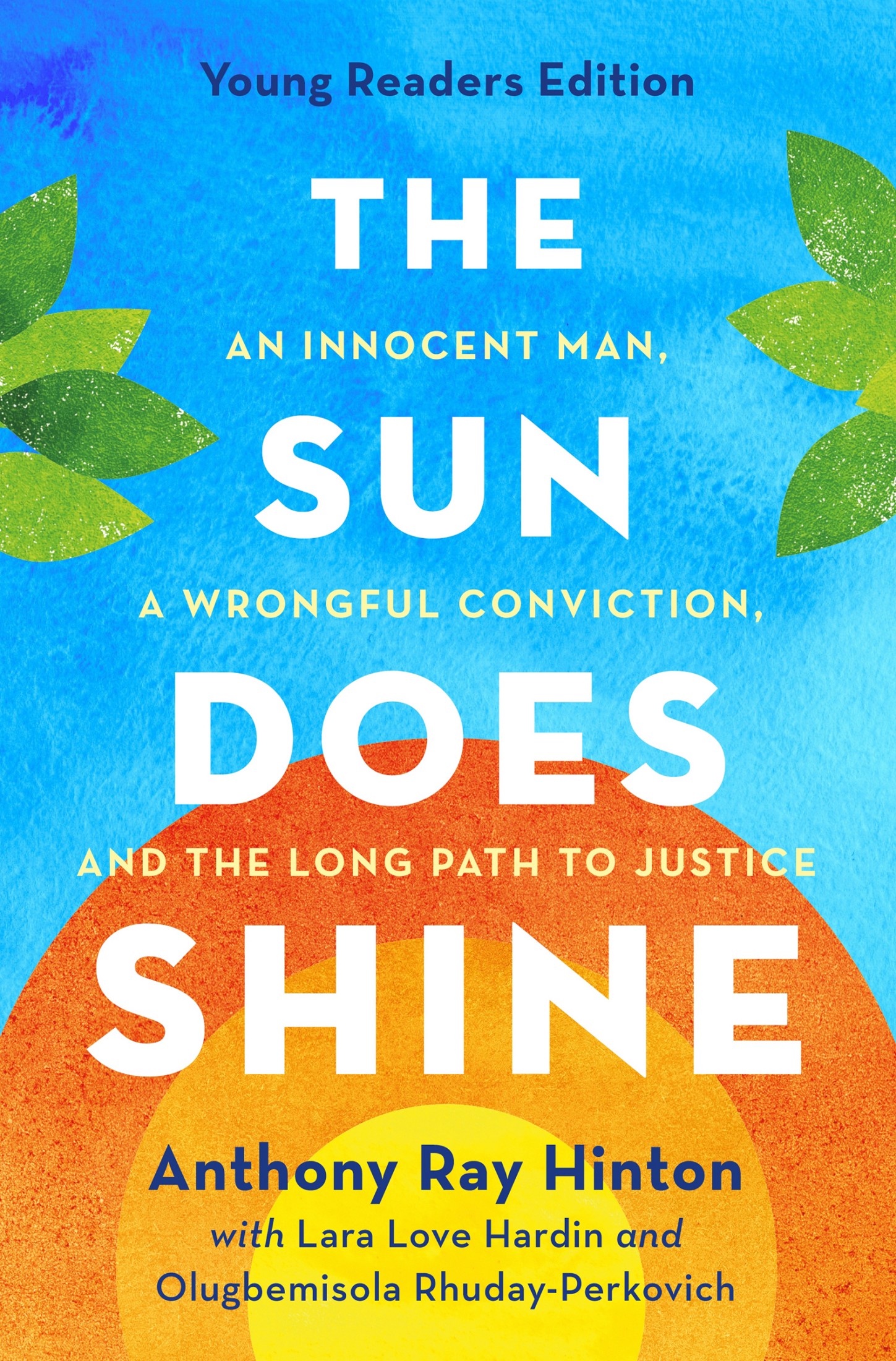
The author and publisher have provided this e-book to you for your personal use only. You may not make this e-book publicly available in any way. Copyright infringement is against the law. If you believe the copy of this e-book you are reading infringes on the authors copyright, please notify the publisher at: us.macmillanusa.com/piracy.
For Lester Bailey, because the friends we make when we are kids can be our best friends for life
On April 3, 2015, Anthony Ray Hinton was released from prison after facing execution for nearly thirty years on Alabamas death row for a crime he did not commit. Mr. Hinton is one of the longest-serving condemned prisoners facing execution in America to be proved innocent and then released.
Thirty years is a long time to be held in solitary confinement, condemned for something you didnt do. It is unjust and tragic, but it happens in America too often. Its one of the reasons some of us believe we need to improve our system and eliminate the bias and unfair practices that made it far too easy for Mr. Hinton to be wrongly condemned.
Mr. Hinton grew up poor and Black in rural Alabama. He learned to be a keen and thoughtful observer of the harsh realities of Jim Crow segregation and the way racial bias constrained the lives of people of color. He was taught by his remarkable mother to never see race or judge people because of their color. He was a poor man in a criminal justice system that treats you better if you are rich and guilty than if you are poor and innocent.
He is blessed with an extraordinary sense of humor, which he relies on to overcome the racial barriers that condemn so many. He lived with his mother until he was in his late twenties and worked as a contract laborer. He had never been accused of a violent act before his arrest.
One night while he was locked in a supermarket warehouse cleaning floors in Bessemer, Alabama, a restaurant manager fifteen miles away was abducted, robbed, and shot by a single gunman as he left work. The victim survived and later misidentified Mr. Hinton as the person whod robbed him. Despite the fact that Mr. Hinton was working in a secure facility with a guard who recorded everyones arrival and departure, miles from the crime scene, police went to the home of Mr. Hintons mother, where they retrieved an old .38 caliber pistol. Alabama state forensic workers asserted that this recovered gun was not only the one used in this recent robbery and attempted murder but also in two other murders in the Bessemer area where restaurant managers had been robbed and killed at closing. Based on this gun evidence, Mr. Hinton was arrested and indicted for both murders, and State prosecutors announced they would seek the death penalty. Mr. Hinton passed a polygraph examination administered by police that confirmed his innocence, but State officials ignored this information and his alibi and persisted in obtaining two convictions and death sentences.
At trial, Mr. Hintons appointed lawyer failed to obtain a competent expert to rebut the States false claims about his mothers gun. For fourteen years, he could not obtain the legal help he needed to prove his innocence. I met Mr. Hinton in 1999, and he made quite an impression. He was thoughtful, sincere, genuine, compassionate, and funny, so it was easy to want to help Anthony Ray Hinton, although it was worrisome to think how difficult it might prove to win his freedom.
I worked with my staff at the Equal Justice Initiative to engage three of the nations top firearms examiners, who all testified that the gun obtained from Mr. Hintons mother could not be matched to the crime evidence. It took fourteen more years of contested litigation and a rare unanimous ruling from the U.S. Supreme Court before Mr. Hinton was released in 2015. During his time on Alabamas death row, Mr. Hinton watched fifty-four men walk past his door on their way to be executed. The execution chamber was thirty feet from his cell.
Mr. Hinton was sustained during his long years on Alabamas death row by a childhood friend who never failed to visit him over the course of nearly thirty years. Lester Bailey insisted that Mr. Hinton never feel alone or abandoned. Mr. Hinton learned to engage those around him and create an identity on death row unlike anything Ive ever seen. Not only did he shape the lives of dozens of other death row prisoners but also those of correctional officers who sought Mr. Hintons advice and counsel on everything from marriage and faith to the struggles of day-to-day life.
While his case created years of disappointment and frustration for Mr. Hinton and cost me many sleepless nights after each adverse legal ruling, we both could be frequently seen doubled over with laughter in the visitation room at Holman State Prison. Such is the extraordinary power of Ray (as his friends call him) Hinton and his remarkable spirit.
Ive visited countless prisons and jails to see hundreds of clients during the course of my career. Im usually ignored or merely tolerated by correctional staff during these visits. There have been times when I have been harassed or challenged by prison staff who seem to resent incarcerated people getting legal visits. Visiting Ray Hinton was unlike any other legal visit for me. Never have more guards, correctional staff, and prison workers pulled me aside to offer assistance or question me about how they could help than during the many years I have worked with Ray. I have never experienced anything like it.
I have represented scores of condemned prisoners during my thirty years of law practice. Many of my clients were innocent people wrongly convicted or condemned. However, no one I have represented has inspired me more than Anthony Ray Hinton, and I believe his compelling and unique story will similarly inspire our nation and readers all over the world.
Reading his story is difficult but necessary. We need to learn things about our criminal legal system, about the legacy of racial bias in America and the way it can blind us to just and fair treatment of people. We need to understand the dangers posed by the politics of fear and anger that can cause us to accept things we should never accept, tolerate things we should never tolerate. We also need to learn about human dignity, about human worth and value. We need to think about the fact that we are all more than the worst thing we have done. Anthony Ray Hintons story helps us understand some of these problems and ultimately what it means to survive, to overcome, and to forgive.
Every person who reads this story has the power to make a difference in the world, to reject unjust and unfair treatment of other people. I believe we all have an obligation to do so. No one should ever go through what Mr. Hinton went through in America, but it will happen again unless we educate ourselves, insist on greater reliability and fairness in our criminal justice system, care more about the poor and those who are vulnerable, and pay attention to how our local systems of justice work.
Mr. Hintons story is one of forgiveness, friendship, and triumph. This book is something of a miracle, because there were many moments when I believe both of us feared he would never survive to tell his story. We should be grateful that he did survive, because his witness, his life, and his journey together create an unforgettable inspiration.
Bryan Stevenson, attorney
More so than the evidence, I have never had as strong a feeling in trying any other case that the defendant just radiated guilt and pure evil as much as in the Hinton trial.


